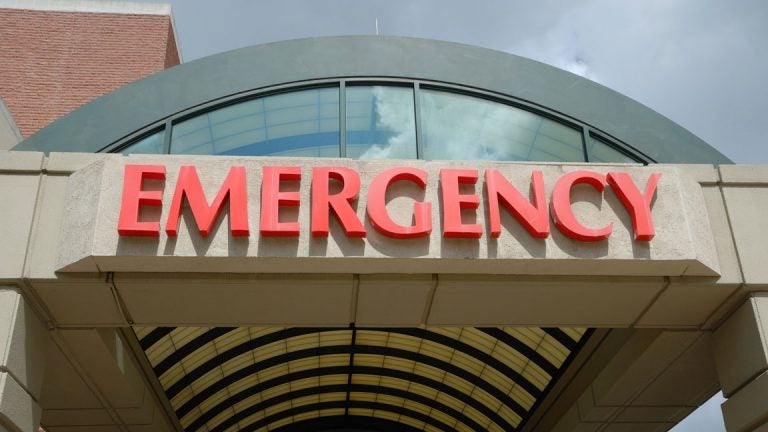Mental health, substance use visits to ER reflect ‘a pandemic within a pandemic’ in N.J.; greatest toll on the young
Though behavioral health cases remain a small number of the overall emergency visits, the increase is causing concern.

A close-up of the entrance to an emergency room. (Paul Brennan/Pixabay)
This story originally appeared on NJ Spotlight.
___
Emergency room visits for mental health and substance use increased proportionally compared to other health concerns at New Jersey hospitals for much of 2020, according to new data. And the trend was greatest among young people, with substance-use cases nearly doubling among those under age 18.
The New Jersey Hospital Association released a report Thursday that shows while emergency room visits for issues other than the coronavirus were down, the proportion of behavioral health concerns identified by doctors was higher between April and December 2020 than during the same nine-month period in 2019. New Jersey’s first COVID-19 case was reported on March 4, 2020, and close to 1 million people have been diagnosed since, including at least 25,000 who have died, according to state figures.
These behavioral health cases remain a small number of the overall emergency visits, with mental health diagnoses comprising less than 7% of all cases across age groups and no more than 2.5% of pediatric cases in NJHA’s analysis. Substance use disorders were even rarer. But hospital emergency rooms are likely to treat only a portion of people with the most severe needs, mental health experts say, and the sudden, steep increase in the proportion of diagnoses is causing concern. And while the pandemic itself may appear to some to be winding down, the greater need for behavioral health services will last for months or years to come, they warn.
“It’s important that we also understand the invisible toll of COVID — the mental health impacts brought on by fear, loss, isolation and, for many families and frontliners, the emotional trauma of this pandemic year,” said hospital association president and CEO Cathy Bennett. “We are only beginning to see the impact on the second victims of COVID-19, and New Jersey must be prepared to address these very real health needs evident across generations.”
Anxiety, depression
The pandemic’s toll on behavioral health has been well documented, with research from the nonprofit Kaiser Family Foundation showing close to half of all adults nationwide reporting stress, anxiety, depression or other issues, up from about one-third before it began. In New Jersey, overdose deaths were on the rise for much of 2020.
When it comes to emergency room visits in New Jersey across all age groups, the hospital association’s Center for Health Analytics, Research and Transformation, or CHART, found the proportion of anxiety diagnoses (compared to all others) rose almost 19% during the last nine months of 2020, versus that period in 2019, and cases of substance use disorder increased nearly 30%. The greatest increase was among young patients, for whom anxiety diagnoses grew 74% and depression diagnoses by more than 84%, according to CHART’s report.
The increased diagnoses among young people did not surprise Dr. Gary Small, chair of the psychiatry department at Hackensack University Medical Center, who works with the emergency departments at Hackensack Meridian Health’s 17 hospitals. “During this pandemic, when this is supposed to be the time of their lives, they have to contend with this social isolation,” he said, noting that social isolation is a predictor of mental health issues for all age groups.
Like hospitals nationwide, Hackensack Meridian is struggling to ensure there is enough capacity in its psychiatric emergency system and that patients who come there in a crisis can be connected to appropriate treatment services, Small said. The health care system is also seeking to better train its family doctors and other clinicians on how to identify behavioral health issues, he said, both among their patients and among their colleagues on staff. (In his recent budget plan, Gov. Phil Murphy proposed $4 million for psychiatry scholarships to help expand treatment capacity statewide.)
PTSD among health care workers
Studies have shown that anxiety, depression and post-traumatic stress disorder have become extremely common among frontline health care workers over the past 13 months, with between 50% and 90% reporting troubling symptoms they had not previously experienced. “We’ve sort of reached this point of exhaustion with our health care team,” Dr. Amy Frieman, Hackensack Meridian’s chief wellness officer, said of the workforce. COVID-19 “is not a typical crisis,” she said, lasting weeks or even months, but “we’ve been in this thing for over a year now.”
To address the needs of its staff, Hackensack Meridian launched an internal campaign under the banner “even heroes need to recharge,” Frieman said. The system established COVID-19 coping groups, in which peers can vent and share strategies, she said, and provided individuals with psychiatric first-aid training to allow them to serve as peer “responders” within each group. In addition, Hackensack has established a 24-7 crisis hotline staffed by licensed behavioral health professionals to provide counseling or refer callers to other services, she said.
“There’s this false idea that self-care is selfish, or maybe it will get in the way of patient care. But the reality is, if we do not take care of ourselves, we will not be able to take care of others,” Frieman said.
Mental health crisis far from over
Hundreds of Hackensack Meridian employees have already taken advantage of these programs, Frieman said, but many more have yet to access help. While daily COVID-19 case counts and hospitalizations have declined in New Jersey and more people are getting immunized against the virus, the mental health crisis is far from over, she and others said. “I don’t think we’ve passed it yet. We have a pandemic within a pandemic,” Small said.
Small of Hackensack University Medical Center said roughly half of all individuals with mental health issues are unlikely to receive treatment; in some cases, they may not recognize the disorder — which could show up as sleeplessness, or changes in appetite — or they may not realize that help is available, he said. But Small and Frieman said stigma continues to surround behavioral health concerns, creating another barrier to help.
“We’re trying to de-stigmatize this care-seeking behavior. That’s a tremendous issue across health care [providers] in general,” Frieman said. She praised Hackensack Meridian for committing to continue these programs for staff, noting, “We have to attend to well-being on an ongoing basis, with a proactive approach, rather than just waiting for a crisis to occur and responding to it.”
Hackensack Meridian Health is not alone in its quest to support its staff and patients in this way. Leaders at University Hospital in Newark — which was nearly overwhelmed by COVID-19 cases last year — has sought to combat stress among employees with free counseling sessions and other services, like hot meals and child care; the hospital has also added staff to deal with what leadership said was an unprecedented level of harmful behaviors among patients, which they attribute to the stress experienced by Newark residents.
The RWJBarnabas Health system, which has 11 hospitals in northern and central Jersey, has taken similar steps to support employees and also created the “hope and healing” program through its Institute for Prevention and Recovery. The program is designed to give emotional support, education and referrals to community-based services to members of the public who are struggling under the pandemic.
Sudden demand for services
The Mental Health Association of New Jersey, a nonprofit that runs behavioral health programs statewide, has also expanded its programming to meet the new need. Jaime Angelini, director of MHA’s disaster programs, sees the sudden demand for services as a positive development, since people are reaching out for help. It is also a sign the stigma around mental health could be declining, she said, much as it did after Superstorm Sandy. “Suddenly everyone’s talking about emotional health and emotional wellness,” she said.
The association runs the federally funded COVID-19 crisis hotline program, through which people can get free emotional support — in English and Spanish — from trained staff via text or phone. (Text NJHOPE to 51684 or call 866-202-HELP or 4357). Angelini said calls to this line have more than doubled since before the pandemic.
MHA offers a range of virtual support groups and workshops and many of the participants have never sought mental health treatment in the past, Angelini said. Peer support groups have been set up for teachers, nurses and other professionals, she added, and the association hosts wellness sessions for staff or clients at other organizations. Another effort seeks to train church leaders to recognize mental health issues in their congregations.
Additional help could come through measures outlined by State Assemblyman Louis Greenwald (D-Camden), who recently introduced a five-bill package to address what he describes as a growing mental health crisis in New Jersey; these proposals now await a hearing. He has been leading the charge on legislation to improve behavioral health services for K-12 students.
Among other things, Greenwald’s bills seek to expand behavioral care options — including through urgent care centers — and better incorporate mental health with physical care. Other measures are designed to ensure those who visit an emergency department connect with follow-up care and help people to better navigate the outpatient network of behavioral health services.
“We know the immense stress and challenges of this past year will likely lead to more New Jersey residents seeking mental health support going forward,” Greenwald said. “Although our hospitals can provide certain emergency services to someone in crisis, ultimately, they are not mental health clinics that can properly address everyone’s specific needs. We must have a system in place that can provide mental health care outside hospital settings for this increased need going forward.”
___
If you or someone you know is in crisis, call the National Suicide Prevention Lifeline at 1-800-273-8255. The hotline is staffed 24/7 by trained counselors who can offer free, confidential support. Spanish speakers can call 1-888-628-9454.
If you or someone you know is struggling with substance use, SAMHSA’s National Helpline is a free, confidential, 24-hour hotline that offers referrals to local treatment facilities, support groups, and community-based organizations. Call 1-800-662-HELP for more information.
WHYY is your source for fact-based, in-depth journalism and information. As a nonprofit organization, we rely on financial support from readers like you. Please give today.




![CoronavirusPandemic_1024x512[1]](https://whyy.org/wp-content/uploads/2020/03/CoronavirusPandemic_1024x5121-300x150.jpg)


